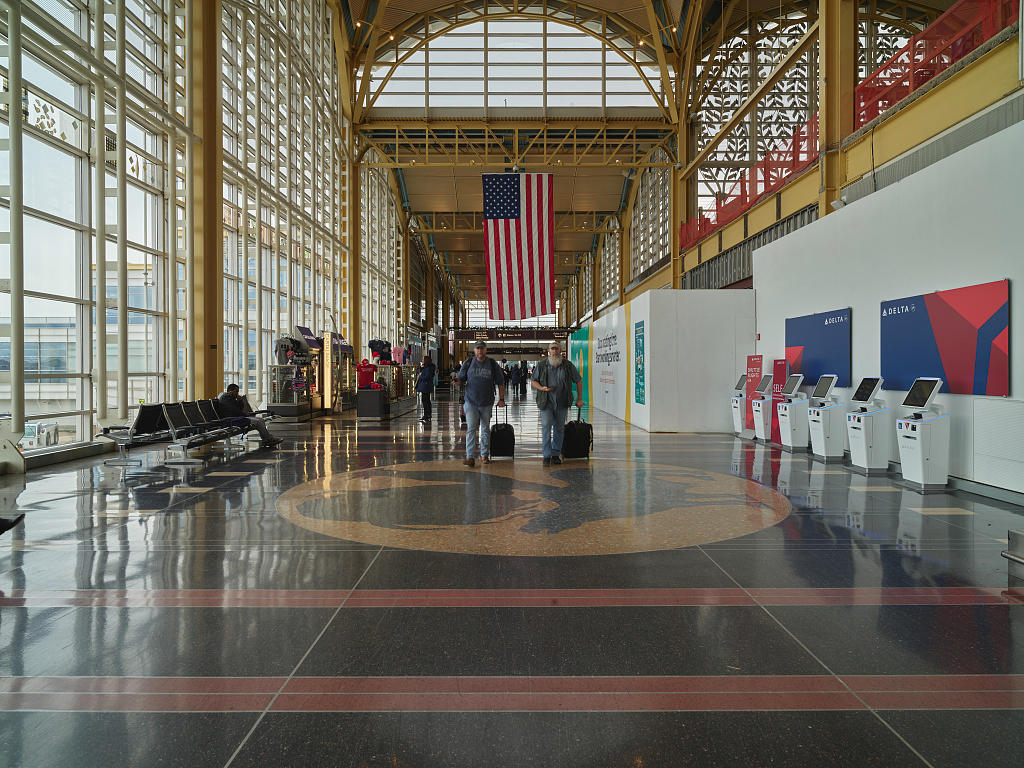U.S. Senate in FAA bill adds flights at Washington National, bucking local opponents

- Oops!Something went wrong.Please try again later.
- Oops!Something went wrong.Please try again later.
- Oops!Something went wrong.Please try again later.
Terminal at Ronald Reagan Washington National Airport in Arlington, Virginia, the closest of three large international airports to, Washington, D.C. (Carol Highsmith/Library of Congress)
WASHINGTON — After hours of uncertainty Thursday, the U.S. Senate struck a deal to reauthorize several Federal Aviation Authority programs for the next five years, though Maryland and Virginia senators were vehemently opposed and lawmakers hoping to attach unrelated provisions lost out.
The bill heads to the House next week for final approval. Lawmakers from the lower chamber left Wednesday after approving a one-week extension for the FAA programs that expire Friday night. The Senate also passed the extension.
The late night vote, 88-4, drew resistance from the Democratic senators representing Maryland and Virginia. They held up speedier passage of the bill over objections to a provision that would allow more flights in and out of Ronald Reagan Washington National Airport, just over the Virginia border from Washington, D.C.
In a joint statement after the vote, Sens. Tim Kaine and Mark Warner of Virginia said the Senate “abdicated its responsibility to protect the safety of the 25 million people” who annually fly through Reagan airport, known as DCA.
The airport, a favorite for lawmakers as it’s closest to the Capitol, is limited by federal regulation on the number of “slots,” or flights that can take off and land per day.
“Just weeks after two aircraft nearly crashed into one another at DCA, this body refused to take up our commonsense amendment to remove a dangerous provision that would have crammed more flights onto the busiest runway in America,” the statement from Kaine and Warner continued, referring to an April 18 near-miss when two planes cleared to take off came within 400 feet of crashing.
The Virginia senators, as well as Sens. Ben Cardin and Chris Van Hollen of Maryland, held out for hours Thursday as they negotiated a vote for an amendment to strike or tighten a provision that would increase slots at DCA to five more landings and five more take-offs.
‘Over 200 member priorities’
Majority Leader Chuck Schumer, D-N.Y., agreed to bring what the senators described as a “compromise” amendment to the floor Thursday evening. The amendment proposed giving the final say on slots to the Transportation secretary after considering delays and safety.
But GOP Sen. Ted Cruz of Texas, one of the bill’s managers, objected, saying that the bill already “contains over 200 member priorities.”
Cruz, ranking member of the Senate Committee on Commerce, managed the bill with the committee’s chair, Democrat Maria Cantwell of Washington.
Cruz is a proponent of increasing slots at DCA, particularly for a direct flight from San Antonio.
Others support the increase as well: Democratic Sen. Raphael Warnock of Georgia had originally proposed adding 28 new slots per day. That idea was scrapped and replaced with Cruz’s amendment to allow five new daily flights in and out.
On the floor Thursday evening, Cruz pushed back on the safety argument, saying that “the FAA experts have recently clarified that this near miss (on April 18) had absolutely nothing to do with traffic on the runway.” He also blamed opposition on a lobbying effort from United Airlines, which operates a massive hub at Dulles International Airport in Virginia and wants to thwart competition.
Cruz said the final bill addresses safety issues by “ensuring we have sufficient air traffic controllers to monitor the traffic and protect safety.”
Late Thursday night after the bill’s passage, Cantwell took the floor to praise provisions that she said expand the aviation workforce, enhance pilot training and protect consumers.
Among its many provisions, the roughly 1,000-page legislation:
Directs the FAA to increase air traffic controller hiring targets;
Raises the commercial pilot retirement age to 67 from 65;
Prohibits mask-wearing and COVID-19 vaccine policies for passengers or employees;
Directs the FAA to update drone testing and operating rules;
Requires the Department of Transportation to create a seating policy to allow children to sit next to parents or guardians at no extra charge; and
Requires airlines to automatically refund customers after three hours of delay for domestic flights and after six hours for international flights.
“These statutory rights are a big win for consumers,” Cantwell said.
Last flight out of the airport
Many lawmakers view the FAA reauthorization bill as the last major vehicle to which they can attach their priorities before November elections and the close of the 118th Congress.
That opportunity disappeared Thursday when the legislation’s managers decided against allowing non-germane amendments to ride on the bill.
Among the proposals lawmakers were eyeing as additions was Oregon Democrat Ron Wyden’s bipartisan tax bill that would expand the child tax credit and revive corporate tax breaks. Another included Sen. Josh Hawley’s Radiation Exposure Compensation Act, or RECA, which would reauthorize a fund for victims of U.S. radiation testing exposure. The fund expires June 7.
Hawley said Thursday afternoon that he wouldn’t object to the FAA bill, even if RECA wasn’t added on.
“I have no desire to tank the FAA reauthorization,” Hawley, a Missouri Republican, told reporters outside the Senate chamber. “I think we should have a reasonable process around it. But, if we’re not going to, we’re not going to.”
“At least we got automatic refunds for consumers out of this deal, which was good,” Hawley added, referring to his amendment with Democratic Sen. Elizabeth Warren of Massachusetts that senators agreed to Tuesday.
Jacob Fischler contributed to this report.
The post U.S. Senate in FAA bill adds flights at Washington National, bucking local opponents appeared first on Virginia Mercury.

